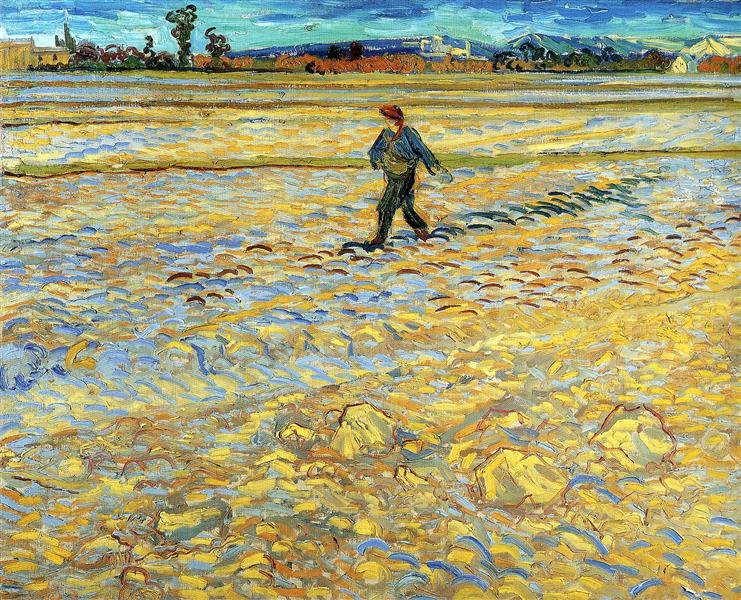Matthew CHAP. 13
13:1–9
1. The same day went Jesus out of the house, and sat by the sea side.
2. And great multitudes were gathered together unto him, so that he went into a ship, and sat; and the whole multitude stood on the shore.
3. And he spake many things unto them in parables, saying, Behold, a sower went forth to sow;
4. And when he sowed, some seeds fell by the way side, and the fowls came and devoured them up:
5. Some fell upon stony places, where they had not much earth: and forthwith they sprung up, because they had no deepness of earth:
6. And when the sun was up, they were scorched; and because they had no root, they withered away.
7. And some fell among thorns; and the thorns sprung up, and choked them:
8. But other fell into good ground, and brought forth fruit, some an hundredfold, some sixtyfold, some thirtyfold.
9. Who hath ears to hear, let him hear.
CHRYSOSTOM. When He had rebuked him that told Him of His mother and His brethren, He then did according to their request; He departed out of the house, having first corrected His brethren for their weak desire of vainglory; He then paid the honour due to His mother, as it is said, The same day Jesus went forth out of the house, and sat down by the sea side.
AUGUSTINE. (De Cons. Ev. ii. 41.) By the words, The same day, he sufficiently shews that these things either followed immediately upon what had gone before, or that many things could not have intervened; unless indeed ‘day’ here after the Scripture manner signifies a period.
RABANUS. For not only the Lord’s words and actions, but His journeyings also, and the places in which He works His mighty works and preaches, are full of heavenly sacraments. After the discourse held in the house, wherein with wicked blasphemy He had been said to have a dæmon, He went out and taught by the sea, to signify that having left Judæa because of their sinful unbelief, He would pass to the salvation of the Gentiles. For the hearts of the Gentiles, long proud and unbelieving, are rightly likened to the swelling and bitter waves of the sea. And who knows not that Judæa was by faith the house of the Lord.
JEROME. For it must be considered, that the multitude could not enter into the house to Jesus, nor be there where the Apostles heard mysteries; therefore the Lord in mercy to them departed out of the house, and sat near the sea of this world, that great numbers might be gathered to Him, and that they might hear on the sea shore what they were not worthy to hear within; And great multitudes were gathered unto him, so that he went into a ship, and sat down, and all the people stood on the shore.
CHRYSOSTOM. The Evangelist did not relate this without a purpose, but that he might shew the Lord’s will therein, who desired so to place the people that He should have none behind Him, but all should be before His face.
HILARY. There is moreover a reason in the subject of His discourse why the Lord should sit in the ship, and the multitude stand on the shore. For He was about to speak in parables, and by this action signifies that they who were without the Church could have no understanding of the Divine Word. The ship offers a type of the Church, within which the word of life is placed, and is preached to those without, and who as being barren sand cannot understand it.
JEROME. Jesus is in the midst of the waves; He is beaten to and fro by the waves, and, secure in His majesty, causes His vessel to come nigh the land, that the people not being in danger, not being surrounded by temptations which they could not endure, might stand on the shore with a firm step, to hear what was said.
RABANUS. Or, that He went into a ship and sat on the sea, signifies that Christ by faith should enter into the hearts of the Gentiles, and should gather together the Church in the sea, that is in the midst of the nations that spake against Him. And the crowd that stood on the sea shore, neither in the ship nor in the sea, offers a figure of those that receive the word of God, and are by faith separated from the sea, that is from the reprobate, but are not yet imbued with heavenly mysteries. It follows; And he spake many things unto them in parables.
CHRYSOSTOM. He had not done thus on the mount; He had not framed His discourse by parables. For there were the multitudes only, and a mixed crowd, but here the Scribes and Pharisees. But He speaks in parables not for this reason only, but to make His sayings plainer, and fix them more fully in the memory, by bringing things before the eyes.
JEROME. And it is to be noted, that He spake not all things to them in parables, but many things, for had He spoken all things in parables, the people would have departed without benefit. He mingles things plain with things dark, that by those things which they understand they may be incited to get knowledge of the things they understand not. The multitude also is not of one opinion, but of divers wills in divers matters, whence He speaks to them in many parables, that each according to their several dispositions may receive some portion of His teaching.
CHRYSOSTOM. He first sets forth a parable to make His hearers more attentive, and because He was about to speak enigmatically, He attracts the attention by this first parable, saying, Behold, a sower went forth to sow his seed.
JEROME. By this sower is typified the Son of God, who sows among the people the word of the Father.
CHRYSOSTOM. Whence then went out He who is every where present, and how went He out? Not in place; but by His incarnation being brought nearer to us by the garb of the flesh. Forasmuch as we because of our sins could not enter in unto Him, He therefore came forth to us.
RABANUS. Or, He went forth, when having left Judea, He passed by the Apostles to the Gentiles.
JEROME. Or, He was within while He was yet in the house, and spake sacraments to His disciples. He went therefore forth from the house, that He might sow seed among the multitudes.
CHRYSOSTOM. When you hear the words, the sower went out to sow, do not suppose that is a tautology. For the sower goes out oftentimes for other ends; as, to break up the ground, to pluck up noxious weeds, to root up thorns, or perform any other species of industry, but this man went forth to sow. What then becomes of that seed? three parts of it perish, and one is preserved; but not all in the same manner, but with a certain difference, as it follows, And as he sowed, some fell by the wayside.
JEROME. This parable Valentinus lays hold of to establish his heresy, bringing in three different natures; the spiritual, the natural or the animal, and the earthly. But there are here four named, one by the wayside, one stony, one thorny, and a fourth the good ground.
CHRYSOSTOM. Next, how is it according to reason to sow seed among thorns, or on stony ground, or by the wayside? Indeed in the material seed and soil of this world it would not be reasonable; for it is impossible that rock should become soil, or that the way should not be the way, or that thorns should not be thorns. But with minds and doctrines it is otherwise; there it is possible that the rock be made rich soil, that the way should be no more trodden upon, and that the thorns should be extirpated. That the most part of the seed then perished, came not of him that sowed, but of the soil that received it, that is the mind. For He that sowed put no difference between rich and poor, wise or foolish, but spoke to all alike; filling up his own part, though foreseeing all things that should come to pass, so that He might say, What ought I to have done that I have not done? (Is. 5:4) He does not pronounce sentence upon them openly and say, this the indolent received and have lost it, this the rich and have choked it, this the careless and have lost it, because He would not harshly reprove them, that He might not alienate them altogether. By this parable also He instructs His disciples, that though the greater part of those that heard them were such as perished, yet that they should not therefore be remiss; for the Lord Himself who foresaw all things, did not on this account desist from sowing.
JEROME. Note that this is the first parable that has been given with its interpretation, and we must beware where the Lord expounds His own teachings, that we do not presume to understand any thing either more or less, or any way otherwise than as so expounded by Him.
RABANUS. But those things which He silently left to our understanding, should be shortly noticed. The wayside is the mind trodden and hardened by the continual passage of evil thoughts; the rock, the hardness of the self-willed mind; the good soil, the gentleness of the obedient mind, the sun, the heat of a raging persecution. The depth of soil, is the honesty of a mind trained by heavenly discipline. But in thus expounding them we should add, that the same things are not always put in one and the same allegorical signification.
JEROME. And we are excited to the understanding of His words, by the advice which follows, He that hath ears to hear, let him hear.
REMIGIUS. These ears to hear, are ears of the mind, to understand namely and do those things which are commanded.
Catena Aurea Matthew 13






